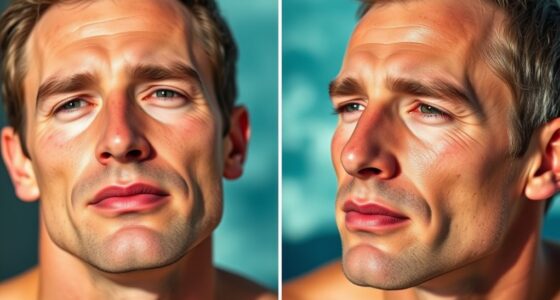When shaving sun-exposed skin, you should be extra cautious to prevent razor burn and damage to your tan. Always wait until any sunburn or irritation heals before shaving, and prep your skin with warm water and gentle, hydrating shaving cream designed for sensitive skin. Use a sharp, clean razor, and avoid shaving over irritated areas. Afterward, rinse with cool water and apply an alcohol-free moisturizer. Keep sun exposure limited post-shave to protect your skin and maintain your tan’s appearance.
Key Takeaways
- Avoid shaving over sunburned or irritated skin to prevent worsening irritation and promote healing.
- Use sharp, clean razors and gentle shaving creams formulated for sensitive skin to reduce razor burn.
- Shave after sun exposure when skin is cooled and hydrated, and always prep with warm water and moisturizing products.
- Moisturize thoroughly post-shave with alcohol-free balms containing soothing ingredients like aloe or chamomile.
- Minimize sun exposure immediately after shaving to prevent further skin irritation and promote faster recovery.

If you’ve been spending time in the sun, shaving your skin requires extra care to prevent irritation and damage. Sun-exposed skin tends to be more sensitive, making it prone to razor burn, nicks, and uneven results. To keep your skin healthy and looking good, start by paying close attention to your grooming routine, especially beard trimming and razor maintenance. Proper beard trimming helps reduce the need for frequent shaves, which can irritate sun-sensitive skin. Keeping your beard well-groomed not only defines your style but also minimizes the area you need to shave regularly, cutting down on potential irritation.
Sun exposure increases skin sensitivity, so proper grooming minimizes irritation and keeps your skin healthy.
When it comes to razor maintenance, make sure your blades are sharp and clean. Dull razors tug at the skin, increasing the risk of razor burn and ingrown hairs, especially on sun-sensitive skin. Replace your blades often, and rinse your razor thoroughly after each use to remove hair and product buildup. A clean, sharp razor glides smoothly over your skin, reducing irritation and giving you a close, comfortable shave. Also, consider using razors with multiple blades or a razor with a pivoting head, as these features help maintain consistent contact with your skin, especially on uneven or sunburned areas.
Before you shave, take time to prepare your skin. Warm water opens your pores, softening hair and making shaving easier. Use a gentle, hydrating shaving cream or gel designed for sensitive skin, and apply it evenly. Avoid harsh soaps that can strip your skin’s natural oils, leaving it dry and more vulnerable to irritation. If your skin is especially sunburned or irritated, it’s best to skip shaving until it heals. Shaving over damaged skin can worsen irritation and prolong healing time.
Post-shave care is just as important. Rinse your skin with cool water to close the pores, then apply an alcohol-free, soothing aftershave balm or moisturizer. Look for products with aloe or chamomile to calm inflammation. Keeping your skin moisturized helps prevent dryness and peeling, especially after sun exposure. It’s also wise to limit direct sun exposure after shaving, as freshly shaved skin can be more sensitive to UV rays, increasing the risk of further irritation or pigmentation issues. Additionally, using a quality home theatre projector with high contrast ratios can help you enjoy your favorite shows in a comfortable, eye-friendly environment, especially when your skin needs extra care.
Frequently Asked Questions
Can Tanning Increase the Risk of Razor Burn?
Tanning effects can increase your skin’s sensitivity, making it more prone to irritation. When you tan, your skin becomes thinner and more delicate, which can heighten the risk of razor burn. If you shave after tanning, you’re likely to experience more irritation and discomfort. To minimize this, wait until your skin calms down and always use gentle shaving techniques to protect your skin from additional damage.
Should I Shave Immediately After Sunbathing?
You shouldn’t shave immediately after sunbathing because your skin’s more sensitive and prone to irritation. Instead, wait a few hours, then apply a soothing post-shave moisturizer to reduce irritation. Remember sun protection tips like using SPF and staying in the shade afterward. Giving your skin time to recover helps prevent razor burn and keeps your skin healthy and smooth, especially after exposure to the sun.
How Does Sun Exposure Affect Razor Burn Healing?
Did you know that excessive sun exposure increases your sunburn sensitivity, making your skin more vulnerable? When you shave over sun-exposed skin, it can slow down the skin healing process, leading to irritation and prolonged discomfort. The heat and UV damage weaken your skin’s barrier, so it’s best to avoid shaving immediately after sunbathing. Allow your skin to recover first, promoting quicker healing and reducing razor burn risks.
Is It Safe to Shave Over a Tan?
Shaving over a tan isn’t safe because sun damage increases your skin’s sensitivity, making it more prone to irritation. When your skin is sun-kissed, it’s already weakened, and shaving can cause further damage, like razor burn or even peeling. It’s best to wait until your tan fades, allowing your skin to recover. Protect your skin from additional harm by shaving gently and moisturizing afterward.
Can Shaving Cause Uneven Tanning or Streaks?
Imagine you shave after a sunless tan, and suddenly, you notice streaks or uneven patches. Shaving can cause uneven tanning or streaks because it irritates your pores, increasing pore sensitivity and leading to skin discoloration. When you shave over a freshly tanned area, the skin’s uneven pigment absorbs the blade differently, making uneven tones more noticeable. To avoid this, prep your skin properly and shave gently.
Conclusion
To keep your skin looking its best, always moisturize after shaving and use a sharp razor. Did you know that nearly 60% of people experience razor burn at some point? Protect your sun-exposed skin by shaving gently and avoiding harsh products. Remember, taking these simple steps can reduce irritation and prevent tans from turning into stubborn dark spots. Stay consistent with your routine, and your skin will thank you for it.









